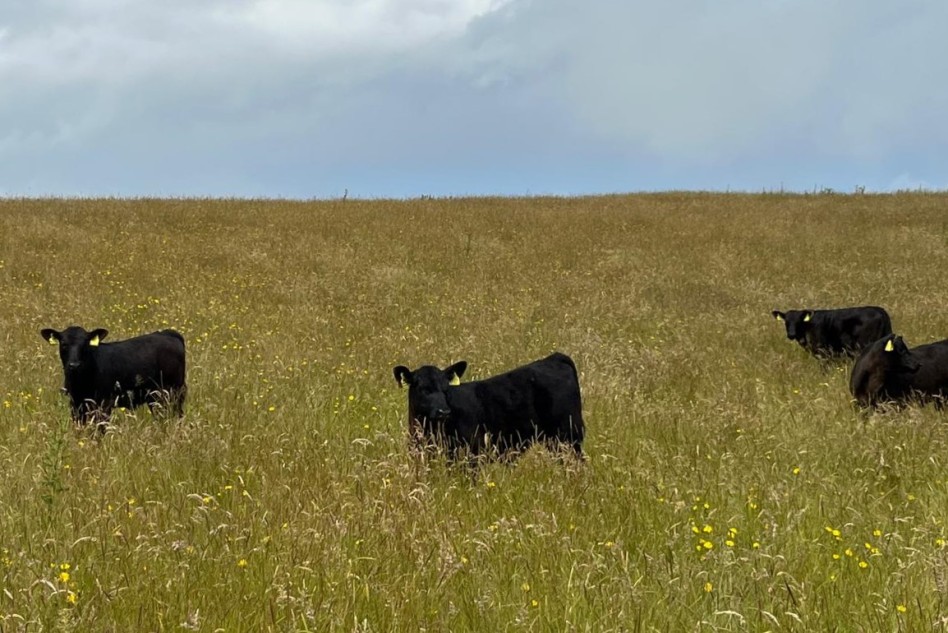NFFN Scotland Chair Denise Walton and her family took over Peelham Farm in 1993, aiming to find a balance between farming for livelihood and farming for wildlife. Peelham produces organic, Pasture for Life-certified beef, which is butchered on the farm. Denise and her family never stop reflecting on the practices used on their farm – looking for things that could be done using more nature-friendly approaches. Read below what has been happening at Peelham Farm this spring, Denise’s thoughts on the current state of play in Scotland, and our new NFFN Scotland team.
The farm is currently a sight to behold: the sun is shining, and the grass is thriving. We've just completed our calving season, with most of it happening outdoors, except for our heifers who we had to keep indoors due to the harsh weather this spring.
We’ve also just completed our mega hedgerow restoration and recreation project, funded by the Nature Restoration Fund from the Scottish Government and administered by NatureScot. We’ve added nearly 11km here at Peelham, and we also involved two of our neighbours. Now that’s completed, we have transformed from a twenty-seven-field farm to a forty-seven-field farm! We’ve split fields up and put hedgerows where there were never any before, and I selected lots of different species – nine different native species - including those such as Rowan and Gean to give the hedgerows structure. The plan is not to trim them, and to let them grow as hedgerow thickets, so they will absorb carbon and produce plenty flowers for pollinators and berries for birds in wintertime. Our cattle will keep the thickets trimmed by nipping the sides of the hedgerows, which will be good for them. Cattle really are more browsers than they are grazers. Although the hedgerows have only just started growing, the 3.0m wide strips through previously open fields are already producing benefits in terms of undisturbed grass and grassy edges providing cover for ground-nesting birds such as Grey Partridge and later summer seed for seed-eating birds. It’s a massive achievement!
When it comes to current rural affairs, recently, we have seen the Farm to Fork summit at Downing Street, which is relevant to the whole of the UK. Food security is on the minds of all policymakers at the moment, including, of course, the NFFN. We’ve always promoted food security or ‘resilience’ on the back of farming with nature. Our Rethink Food campaign and seminar last year ‘Rethink Food: the value of diversity in Scotland’, promoted biodiversity and soil health as the basis for reliable, nutrient-dense food. So yes, food resilience is crucial, but you must address food waste and natural resource degradation - particularly soils to achieve it sustainably.
I’ve been invited to a roundtable by the Chair of Nature Scot, Prof Colin Galbraith, which will look at food production, climate, and nature. This comes from Nature Scot, the Scottish Government’s wildlife advisory body, looking at food production in relation to nature. I will also be part of a roundtable later in June, put together by the South of Scotland Enterprise (SOSE), looking at food security in the southern Scotland region. Food security is creeping up the priority list of policymakers, but we need to be very sure that it’s not food security and production at all costs, which we know is just a cover for the status quo that has got to change.
In addition to all of that, we have a new First Minister, John Swinney, who has a rural constituency north of Perth, so he will have an insight into the rural economy, including agriculture. But he is an economist at heart, so we must be careful to make a very strong point with him as the NFFN regarding the importance of farming with nature as the most secure way of producing food. We are pleased that Mairi Gougeon, Cabinet Secretary for Rural Affairs, Land Reform and Islands, is staying in post. She’s been a reliable, safe pair of hands for our position as the NFFN. Euan Ross, our NFFN Scotland Manager, has been contributing to the debates on the Agriculture Bill and following through with all the amendments. So far so good – with a few disappointments of course - but there’s still a long way to go. We work with the Scottish Agroecology Action Group (SAAG) which involves other land-based organisations, and together we make sure our policy points add a lot of volume and gain traction when it comes to presenting to Holyrood.
NFFN Scotland is in a very exciting place now. We have recently taken on new steering group members, so we have an exciting group of farmers now, and with Euan Ross, our Scotland Manager, and Rachael Cratchley, our Scotland Sustainable Farming Officer, we’ve got wonderful prospects. Euan has expertise and insight into policy - he’s ideally positioned to watch the development of the agriculture bill and other legislative developments affecting rural Scotland. Rachael has an insight into working with farmers on projects, and she brings with her a background in dairy, which balances the livestock and arable sectors represented in the organisation.
Rachael, Euan and I are going to spend some time at the Royal Highland Show towards then end of the month including attendance at a number of receptions there. So yes, a lot going on and Rachael and Euan are working with other land-based organisations in Scotland to see where we can work together without duplication, which is very important. NFFN is really set for a very exciting period here in Scotland, and I feel genuinely hugely privileged to work with the NFFN, Euan and Rachael, and our Scottish steering group towards a nature-friendly farming future.


